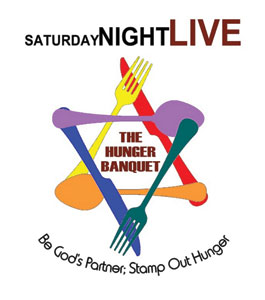 An estimated 1 billion people in the world go to bed hungry every night. That’s one in every seven people.
An estimated 1 billion people in the world go to bed hungry every night. That’s one in every seven people.
Most people can’t comprehend such a large number by just reading about it. So the Social Justice Committee of The Temple, Congregation B’nai Jehudah, is hoping people will understand the issue better, and make a commitment to do their part to help solve it, on Saturday night April 16, when it presents the Hunger Banquet. Co-sponsored by B’nai Jehduah’s religious school, it’s a part of the congregation’s annual Saturday Nite Live program. It’s underwritten in memory of Shirley and Alfred Kohlman and is open to all members of the Reform congregation.
Karen “Gustie” Herman, who is chairing the event, pointed out that the Hunger Banquet is for members of the congregation and invited interfaith guests. Those interested in learning more may contact her at (913) 217-7865.
She explained that the Hunger Banquet will be an interactive dramatization of food inequalities around the world. Guest will be assigned roles that represent different income levels. What each person receives for dinner will depend on their role, so some will have a lot to eat and others won’t have enough. (For this reason young families and seniors may want to eat before attending.)
The committee has teamed with Harvesters, The Hunger Project and United Community Services of Johnson County to plan this event. The keynote speaker will be Karen Herman (who coincidentally has the same name as Hunger Banquet chairperson Karen “Gustie” Herman) who represents The Hunger Project, an international non-governmental organization that has been working since 1974 to address hunger issues across the globe. Valorie Carson, the community planning director for United Community Services of Johnson County will also speak about the many effects of hunger on homeless individuals and families here in Johnson County.
Karen “Gustie” Herman explained that the Hunger Banquet was designed by Oxfam, an international organization that works to find lasting solutions to poverty and injustice. This particular program teaches about the inequalities of food in the world.
Herman noted that only 15 percent of the people in the world are classified as high income, making more than $9,386 per year. Another 30 percent of people in the world have per capita incomes between $766 and 9,285 per year. Those who make less than 765 per year — living on less than $2 per day — make up 55 percent of the world’s population.
“The Hunger Banquet emphasizes that inequity because here in Johnson County, we don’t understand that reality,” Herman said.
“A lot of people think everybody is rich in Johnson County,” added Joann Kinney, a member of the Hunger Banquet committee.
In fact, according to United Community Services of Johnson County, poverty in Johnson County has more than doubled from 2000 to 2009.
“Suburban poverty has increased at a higher rate than urban poverty,” Kinney said.
An interactive experience
Kinney said that people who attend the Hunger Banquet will be given a card when they arrive which describes their role for the evening.
“The people who are playing the role of upper income people will go to a table set with a table cloth, china, crystal and flowers and they’ll be served a three-course meal,” Kinney said. “Those in the middle income will sit at a plain table and they will get a bowl of rice and beans and water. Lower income people will sit on the floor and eat rice.”
The room will be divided according to the hunger statistics. That means 15 percent will be high income, 30 percent will be middle income and 55 percent will be low income. Arrangements have been made for people with disabilities and those who have difficulties sitting on the floor to still be able to participate in the program.
Those who are middle and lower income will at times be uncomfortable, the organizers pointed out.
“It will be a wonderful visual of the inequalities of food and teach everyone, there will be a lot of children there as well as adults, what it’s really like to be hungry and not to have enough to eat,” Herman said.
Following dinner, participants will attend three 18-minute break-out sessions to learn more about hunger — hunger in the world and Israel, hunger in the United States and Johnson County as well as a craft project. Religious school teachers are designing all the craft sessions.
B’nai Jehudah’s social justice committee has several ongoing programs to help the hungry throughout the city. Before the evening concludes, Herman and Kinney said participants will have an opportunity to make a personal commitment to help stamp out hunger.


